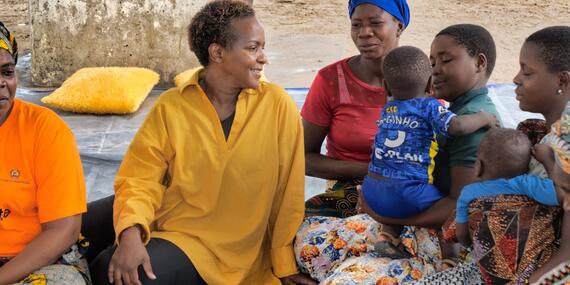UN deputy relief chief concludes visit to southern, eastern Africa

(New York, 17 November 2023) Wrapping up a visit to four countries in southern and eastern Africa ahead of the UN Climate Change Conference (COP 28), Assistant Secretary-General for Humanitarian Affairs Joyce Msuya stressed the United Nations’ commitment to standing with the people and Governments of the region, as the climate crisis drives humanitarian needs ever higher.
“Given the African continent’s vulnerability to climate shocks, people are bravely forging their own solutions when it comes to prevention and adaptation,” Ms. Msuya, who also serves as Deputy Emergency Relief Coordinator, said at the end of her three-week mission. “At COP 28, the rest of the world must make clear that they won’t face these challenges alone.”
There are some 168 million people in need of humanitarian assistance in sub-Saharan Africa. The climate threat is compounding the effects of conflict and related displacement in some areas of the region, increasingly becoming one of the biggest drivers of needs.
Ms. Msuya saw this first-hand in Mozambique, the first country on her trip, where the combined impact of cyclones, conflict and climate change has plunged more than 2 million people into humanitarian need.
The Assistant Secretary-General met with Government officials, including the Minister of Transport and Communication; Minister of Public Works, Housing and Water Resources; and Vice Minister of Foreign Affairs and Cooperation. They discussed efforts to prepare for El Niño, a positive Indian Ocean Dipole, and the early 2024 cyclone season – amid ongoing humanitarian needs.
In the northern province of Cabo Delgado, the Assistant Secretary-General witnessed how the humanitarian community is helping build the resilience of local communities. There, she spoke with people who had returned to the district of Mocímboa da Praia, after fleeing the violence which erupted in 2017.
In Tanzania, Ms. Msuya met with President Samia Suluhu Hassan to explore ways to empower local communities in countering the climate threat and to ensure they have the resources they need to act ahead of disasters.
Continuing her mission in Kenya, the Assistant Secretary-General held talks with Deputy President Rigathi Gachagua, underscoring the UN’s support for the Government-led response to the drought and El Niño-induced flooding that has displaced more than 122,000 people in the last three weeks.
In Botswana, Ms. Msuya met with President Mokgweetsi Masisi to discuss the country’s enduring commitment to the multilateral system, as well as climate mobility strategies to help front-line communities adapt.
Throughout her mission, the Assistant Secretary-General reaffirmed the UN Office for the Coordination of Humanitarian Affairs’ support for the rest of the humanitarian community, and the importance of OCHA’s partnerships with the Southern African Development Community (SADC) and World Bank, as well as the private sector. At SADC’s Humanitarian and Emergency Operations Centre, she saw first-hand how the facility stands to revolutionize disaster preparedness and response in the region.
“The resilience of communities in Mozambique, Tanzania, Kenya and Botswana should inspire us all to act,” Ms. Msuya said. “This means tangible commitments to close the gap on climate financing – because those on the frontlines cannot afford to wait.”
For further information, please contact:
In New York: Eri Kaneko, (+1) 917 208 8910, kaneko@un.org
In Geneva: Jens Laerke, (+41) 79 472 9750, laerke@un.org
B-roll of the mission available here: https://www.unocha.org/media-centre/mozambique-asg-msuya-visit-16-november-2023
